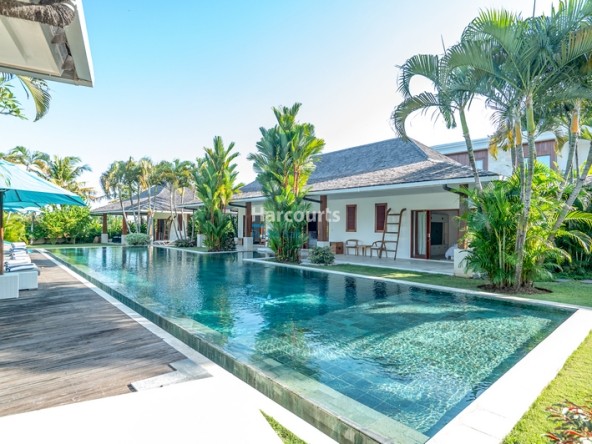Bali, often referred to as the “Island of the Gods,” captivates with its azure waters, lush rice paddies, and dynamic cultural landscape.
This guide helps foreigners understand how to buy property in Bali legally and safely.
We’ll cover the main rules, options like leasehold and the Right to Use, and how to navigate the Indonesian property market.
Whether you’re looking for a holiday home or a permanent residence, we’ll show you how to make your Bali property dream come true.
Understanding Ownership Restrictions
Types of Property Ownership in Bali:
Leasehold (Hak Sewa):
- Suitable for all visa holders, including tourists.
- Offers a straightforward process without needing a residence permit or company registration.
- Provides control over the property for 25-30 years with possible extensions.
- Popular among foreigners due to its simplicity and flexibility.
Right to Build (Hak Guna Bangunan/HGB):
- Requires owning a PT PMA (foreign-owned company) and a KITAS (residence permit).
- Allows ownership for up to 70 years (30 years, plus 20-year extension and renewal).
- Property can be inherited, sold, or converted to Hak Milik for Indonesians.
- Involves a more complex process compared to leasehold.
Right to Use (Hak Pakai):
- Similar to HGB, requiring a KITAS and offering up to 70 years of ownership.
- Limited to individuals owning one property with existing buildings.
- Restricts operation as a business and requires a minimum property value.
- Allows inheritance and sale to Indonesian nationals.
Right to Own (Hak Milik):
- Exclusive to Indonesian citizens and entities.
- Offers hereditary, permanent ownership.
- The strongest form of property title in Indonesia.
Key Points for Foreign Buyers:
- Leasehold properties are the easiest option for foreigners looking to invest in Bali without the complications of permits and company registration.
- HGB and Hak Pakai titles offer longer ownership terms but require navigating more complex legal requirements, including the need for a KITAS and, in the case of HGB, a PT PMA.
- Hak Milik is not available to foreigners but represents the most secure form of property ownership for Indonesians.
Setting the Stage: Essential Prerequisites
Visa and Residency
Acquiring property necessitates a valid temporary or permanent residency permit (KITAS or KITAP) or a retirement visa for those aged 55 and above. The process involves engaging with the Indonesian immigration system and ensuring your visa aligns with your property ownership goals.
Legal Representation
Collaborate with a reputable lawyer specializing in Indonesian property law to navigate legal complexities, negotiate contracts, and ensure transparency. A reliable lawyer will guide you through the bureaucratic hurdles, ensuring compliance with local regulations and safeguarding your interests.
Financial Planning
Establish a comprehensive budget, factoring in property costs, taxes, and ongoing maintenance expenses. It’s crucial to understand the financial commitment involved and account for potential fluctuations in the exchange rate.
The Buying Journey: Step-by-Step
Find Your Dream Property
Explore available options through real estate agents, online listings, or personal connections, considering location, land size, and property type. Engage with local communities to gain insights into the neighborhood dynamics and potential future developments.
Due Diligence is Key
Avoid falling for paradise promises by thoroughly investigating the property and seller. Verify land certificates, zoning regulations, building permits, and potential encumbrances through a title search and property valuation. Engage a surveyor to ensure the boundaries align with the documentation.
Negotiate the Terms
Work with your lawyer to negotiate a fair price and draft a legally binding purchase agreement. This document should articulate payment terms, property details, ownership rights, and dispute resolution mechanisms. Understanding the negotiation culture in Bali is crucial – it often involves building relationships and demonstrating respect for local customs.
Financing Options
Explore mortgage options from Indonesian banks or international lenders specializing in overseas property financing. Secure pre-approval before finalizing the deal. Consider the implications of currency fluctuations on your mortgage, and explore financing terms that align with your long-term financial strategy.
The Notarial Process
After agreement signing, a notary public formalizes the transaction, ensuring legal validity. Register the deed with the Land Office (“Badan Pertanahan”) for official recognition. This step is crucial for securing your property rights and protecting your investment.
Taxation and Fees
Anticipate annual property taxes, transfer fees upon purchase, and potential inheritance taxes. Seek advice from your lawyer and accountant for precise details. Understanding the tax implications of property ownership in Indonesia is vital for long-term financial planning.
Beyond the Basics: Additional Considerations
Building Permits and Construction
If building on Hak Pakai land, secure necessary permits and adhere to construction regulations meticulously. Engage with local architects and builders who understand the intricacies of Balinese building codes. Factor in the time and resources required for the construction process.
Property Management
Consider hiring a local property manager for maintenance, rentals, and administrative tasks, especially if you won’t reside in Bali full-time. A reliable property manager can navigate local regulations, handle tenant relationships, and ensure the property remains in optimal condition.
Exit Strategy
Plan for the future by understanding potential market trends and exit options. Ensure your property can be sold easily when needed. Stay informed about changes in the local real estate market and consider consulting with a real estate expert to strategize your exit plan.
While Indonesian nominee arrangements may seem tempting, they are illegal and carry high risks. It’s crucial to avoid such practices and opt for legal ownership structures for a secure and ethical investment. Engage with reputable real estate agents and legal professionals who prioritize ethical business practices.
Read more: Building Your Dream Bali Villa: A Comprehensive 7 Step Guide
Acquiring property in Bali is a rewarding experience. Embrace the cultural nuances, the laid-back pace, and the inherent complexities as part of the adventure. Immerse yourself in the local community, learn the Balinese way of life, and contribute positively to the environment you become a part of. With meticulous planning, expert guidance, and patience, you can confidently navigate the Balinese property market, turning it into your own slice of paradise.
As you embark on your Bali property journey, consider consulting with Harcourts Purba Bali, a reliable and trusted real estate agency with a wealth of experience in the Indonesian property market.
Explore ideal investment opportunities on our Freehold Villas for sale in Bali listing page for lasting ownership. For a leasehold option, visit our Leasehold Villas in Bali listing page.
Our team of professionals can provide personalized guidance, ensuring a smooth and secure transaction.
Contact us to start your journey of owning a piece of paradise with confidence.




